aŭg . 16, 2025 02:40 Back to list
Professional Embroidery Machine: High-Quality T-Shirt Production
Transforming Textile Production: The Evolution of Professional Embroidery Machines
The landscape of textile and apparel customization has been dramatically reshaped by advancements in automated machinery, with the professional embroidery machine standing at the forefront of this revolution. These sophisticated devices have evolved from simple manual tools to highly complex, computer-controlled systems, capable of executing intricate designs with unparalleled precision and speed. In an era where bespoke branding and personalized fashion dominate market demand, the efficiency and versatility offered by modern embroidery equipment are indispensable for businesses ranging from small custom apparel shops to large-scale manufacturing facilities. The ability to seamlessly integrate digital designs with physical textile substrates has opened new avenues for creativity and mass customization, driving significant growth across various sectors. This transformation is not merely about production capacity but also about achieving design complexity and consistency that was previously unimaginable. The demand for high-quality, durable, and visually striking embroidered goods continues to rise, pushing manufacturers to innovate and deliver machines that meet increasingly stringent operational and aesthetic requirements, ensuring that every stitch contributes to a flawless final product. The shift towards multi-head systems and advanced software integration marks a pivotal moment, allowing for concurrent production of diverse items or large volumes of identical designs, fundamentally altering traditional production bottlenecks and enhancing throughput.
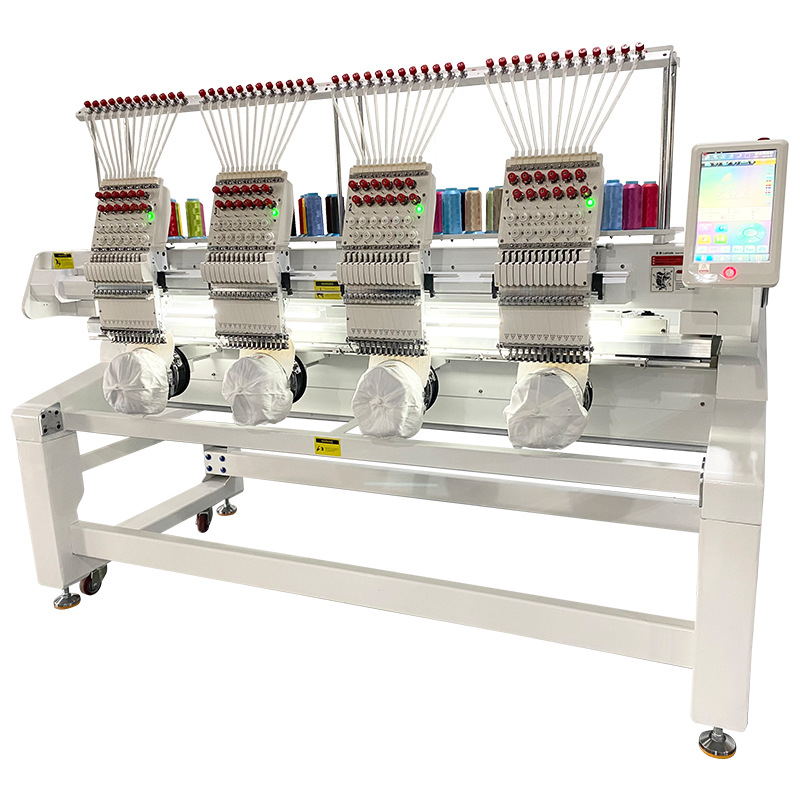
The core functionality of a modern professional embroidery machine lies in its precision engineering and advanced digital control. Unlike conventional sewing machines, embroidery machines utilize a computer-aided design (CAD) file, often in formats like DST or EXP, to dictate the exact movement of the needle and the sequencing of thread colors. This digital blueprint ensures absolute fidelity to the original design, translating complex graphics into physical stitches with microscopic accuracy. Key components include the embroidery hoop, which securely holds the fabric; the needle system, often comprising multiple needles (e.g., 12 or 15) for rapid color changes; and the tensioning system, crucial for maintaining optimal thread tension to prevent puckering or looping. The integration of high-speed servo motors allows for incredibly fast stitching, reaching speeds of up to 1200 stitches per minute (SPM) or more, significantly boosting productivity for high-volume orders. Furthermore, intelligent features such as automatic thread trimming, thread break detection, and automatic color changes minimize operator intervention, reducing labor costs and potential errors. These technological enhancements underscore the machine's role not just as a tool for decoration, but as a sophisticated manufacturing system designed for industrial-grade performance and reliability, ensuring consistent output across thousands of items. The robust construction and sophisticated electronic controls are vital for continuous operation in demanding commercial environments, guaranteeing longevity and consistent high-quality results.
Industry Trends and Technological Evolution Shaping Modern Embroidery
The embroidery industry is experiencing dynamic shifts, driven by technological advancements and evolving market demands for personalized and high-quality textile embellishments. One significant trend is the increasing adoption of multi-head embroidery machines, which significantly boost production efficiency by allowing multiple items to be embroidered simultaneously. For instance, a 4-head 12-needle machine, like the Embroidery Machines Computerized 4 head 12 needle New Second Hand Embroidery Machine, exemplifies this trend, enabling businesses to fulfill large orders of custom apparel, including specialized t shirt embroidery machine applications, with unprecedented speed. Another crucial development is the integration of sophisticated software, including advanced digitizing programs and machine management systems, which streamline the design-to-production workflow. These programs offer enhanced control over stitch types, density, and design placement, translating into superior visual quality and reduced material waste. Furthermore, the push towards sustainability is influencing machine design, with newer models focusing on energy efficiency and reduced noise levels, aligning with global environmental standards. The growing demand for intricate, high-definition embroidery has also led to innovations in needle technology and thread materials, allowing for finer details and greater durability of finished products.
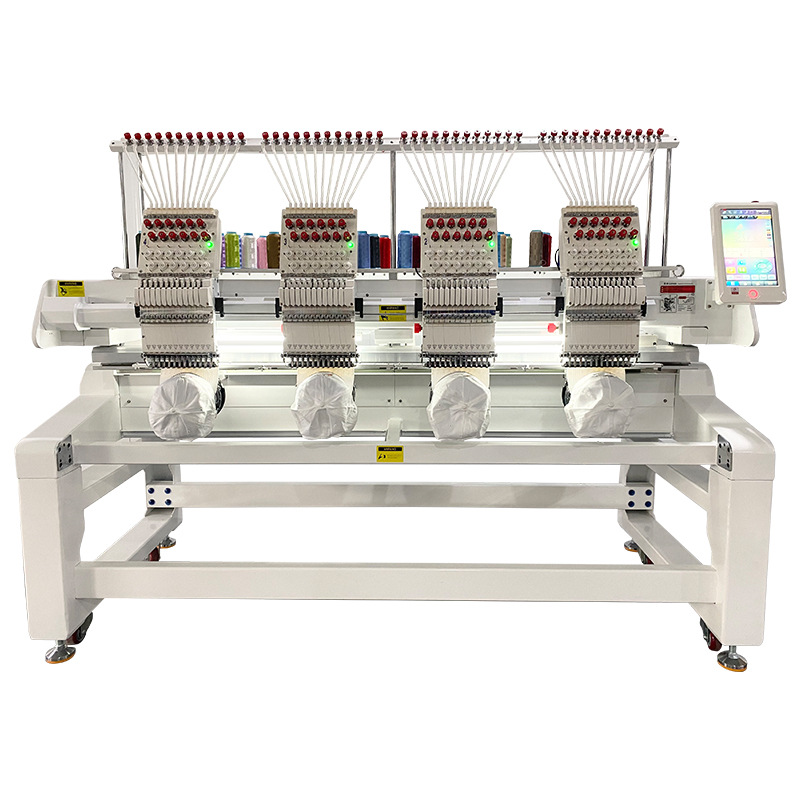
Beyond hardware, the embroidery sector is witnessing a surge in automation and connectivity, embodying the principles of Industry 4.0. Modern professional embroidery machine units often feature built-in Wi-Fi or Ethernet capabilities, enabling remote monitoring, diagnostic troubleshooting, and seamless transfer of design files from a central database. This connectivity is vital for optimizing production schedules and minimizing downtime in busy commercial environments. Cloud-based platforms are also emerging, offering businesses scalable solutions for design storage, order management, and even predictive maintenance. The rise of e-commerce and on-demand manufacturing models further fuels the need for highly adaptable and efficient embroidery solutions. Companies require machines that can quickly switch between different jobs, handle a variety of fabric types, and integrate with existing production lines. This flexibility is particularly important for businesses specializing in personalized items or short-run custom apparel. According to market research, the global embroidery machine market is projected to grow significantly, driven by increasing disposable incomes, a flourishing fashion industry, and the rising popularity of customized products, indicating a robust future for advanced embroidery technology.
Core Technical Parameters and Specifications of Advanced Embroidery Systems
Understanding the core technical parameters is essential when selecting a professional embroidery machine for commercial operations. Key specifications dictate a machine's performance, versatility, and suitability for various applications. For instance, the number of heads (e.g., 4-head) directly correlates with the production capacity, allowing multiple items to be embroidered simultaneously. The needle count (e.g., 12 or 15 needles) determines the number of colors a machine can use without manual thread changes, significantly impacting efficiency for multi-colored designs. Stitch speed, measured in stitches per minute (SPM), indicates how quickly a machine can complete a design, with high-end models offering speeds up to 1200-1500 SPM. Embroidery area, or hoop size, defines the maximum size of a design that can be stitched on an item without re-hooping; common sizes range from 300x200mm to 500x360mm for flat items and specialized hoops for caps and sleeves. Furthermore, the type of motor, typically servo motors, ensures precise control, quiet operation, and energy efficiency. Control systems, often featuring intuitive touchscreens, provide easy access to design libraries, machine settings, and real-time operational data. Compatibility with various design file formats (e.g., DST, EXP, HUS) is also crucial for seamless integration with design software.
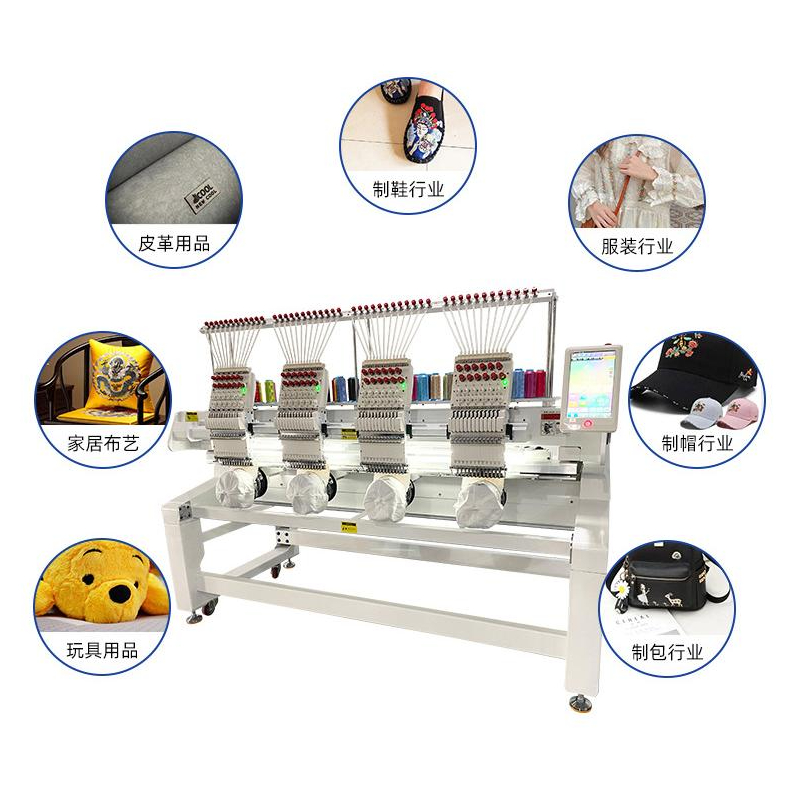
To provide a clearer overview, here is a table detailing common technical parameters found in high-performance professional embroidery machine models, including those optimized for t shirt embroidery machine applications. These parameters directly influence the machine's throughput, precision, and overall return on investment for businesses. Understanding these specifications allows buyers to make informed decisions tailored to their specific production needs and budget constraints, ensuring the selected machine can handle current and future operational demands.
| Parameter | Description | Typical Range / Value |
|---|---|---|
| Number of Heads | Simultaneous embroidery capability | 1 to 20+ (e.g., 4-head for specific product) |
| Needle Count | Number of thread colors available without change | 9, 12, 15, or 16 needles |
| Max Stitch Speed | Maximum stitches per minute (SPM) | 850 – 1200 SPM (up to 1500 for specialty) |
| Embroidery Area (Flat) | Max design size on flat items | 300x200mm to 500x360mm+ |
| Embroidery Area (Cap) | Max design size on caps | 70x270mm to 80x360mm (typical) |
| Control Panel | Interface for operation and design management | 7-inch to 10-inch HD Touch Screen |
| Memory Capacity | Storage for design files | 2,000,000 to 100,000,000 stitches / 200+ designs |
| Connectivity | Methods for file transfer and networking | USB, LAN, Wi-Fi |
| Power Consumption | Energy usage during operation | 150W - 400W (single head), up to 1500W (multi-head) |
| Certifications | Compliance with international standards | CE, ISO9001, FCC |
Precision Engineering: The Manufacturing Process of Professional Embroidery Machines
The manufacturing of a professional embroidery machine is a complex process demanding extreme precision and adherence to rigorous quality standards. It begins with the selection of high-grade materials, typically aerospace-grade aluminum and specialized steel alloys, chosen for their durability, stability, and vibration-dampening properties. Components are often produced using advanced manufacturing techniques such as CNC (Computer Numerical Control) machining, which ensures micron-level accuracy for critical parts like the needle bar, rotary hook, and tension assemblies. This precision is vital for consistent stitch quality, especially at high operating speeds. Frame components may undergo casting or forging processes to achieve robust structural integrity before precise machining. Each component is meticulously inspected against strict specifications, often exceeding ISO 9001 quality management standards, to ensure perfect alignment and minimal friction. The internal wiring and electronic controls, including servo motor integration and motherboard design, are engineered for seamless data flow and robust performance, typically undergoing electromagnetic compatibility (EMC) testing to prevent interference and ensure reliable operation in industrial settings.
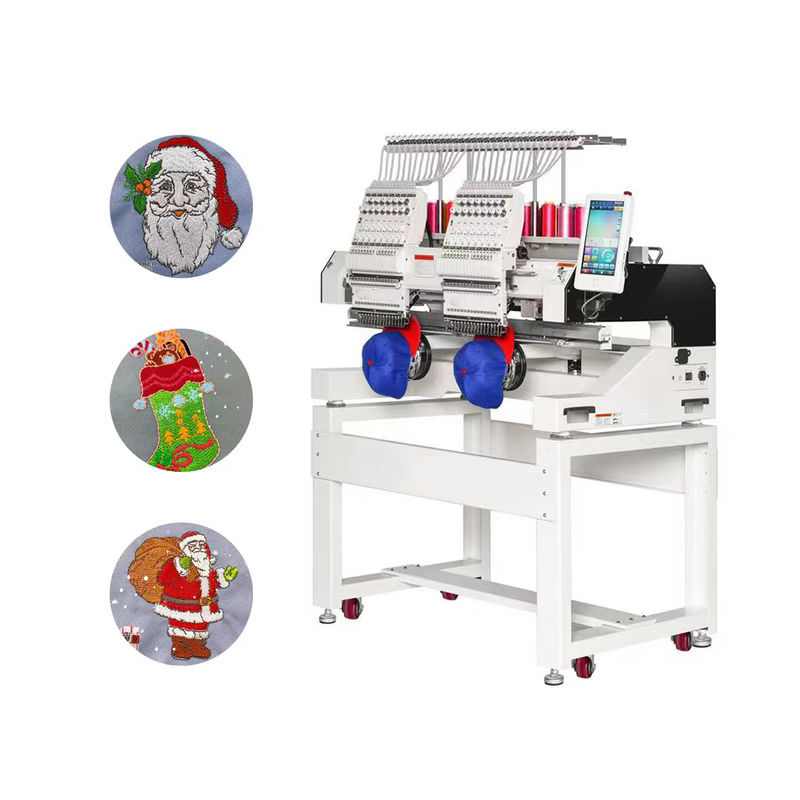
Following component fabrication, the assembly phase involves skilled technicians meticulously putting together hundreds of parts. Critical processes include calibrating the tensioning system, aligning the needle bars, and integrating the control panel and software. Each assembled machine undergoes a series of stringent quality control checks and performance tests. These include extensive stress tests to evaluate durability under continuous high-speed operation, vibration analysis to ensure stability, and detailed stitch quality assessments across various fabric types and design complexities. For machines designed for specific tasks, like a t shirt embroidery machine, additional tests are conducted to verify performance on stretchable fabrics and specific garment types. Life cycle testing is also performed to estimate and ensure an impressive operational lifespan, often projected for 10-15 years or more with proper maintenance. Compliance with international safety and performance standards such as CE (Conformité Européenne) and FCC (Federal Communications Commission) is mandatory, reflecting the machine's adherence to global quality and safety benchmarks, assuring buyers of a reliable and high-performing asset for their business.
Diverse Application Scenarios and Industry-Specific Benefits
The versatility of a professional embroidery machine extends across a myriad of industries, offering unique benefits tailored to diverse production needs. In the fashion and apparel sector, these machines are indispensable for creating intricate designs on ready-to-wear garments, haute couture, and sportswear. The ability to handle various fabrics, from delicate silks to robust denim, with consistent precision, makes them ideal for custom apparel lines and mass production alike. For promotional products and corporate branding, multi-head machines, like the Embroidery Machines Computerized 4 head 12 needle New Second Hand Embroidery Machine, excel at personalizing large quantities of items such as hats, polo shirts, and jackets with company logos or event branding. The efficiency of a multi-head t shirt embroidery machine system drastically reduces lead times for bulk orders, making it a cornerstone for promotional goods suppliers. In the home decor industry, professional machines are utilized for embellishing linens, curtains, and upholstery, adding a touch of bespoke elegance to interior spaces. The precision ensures that even complex patterns align perfectly across large fabric panels.
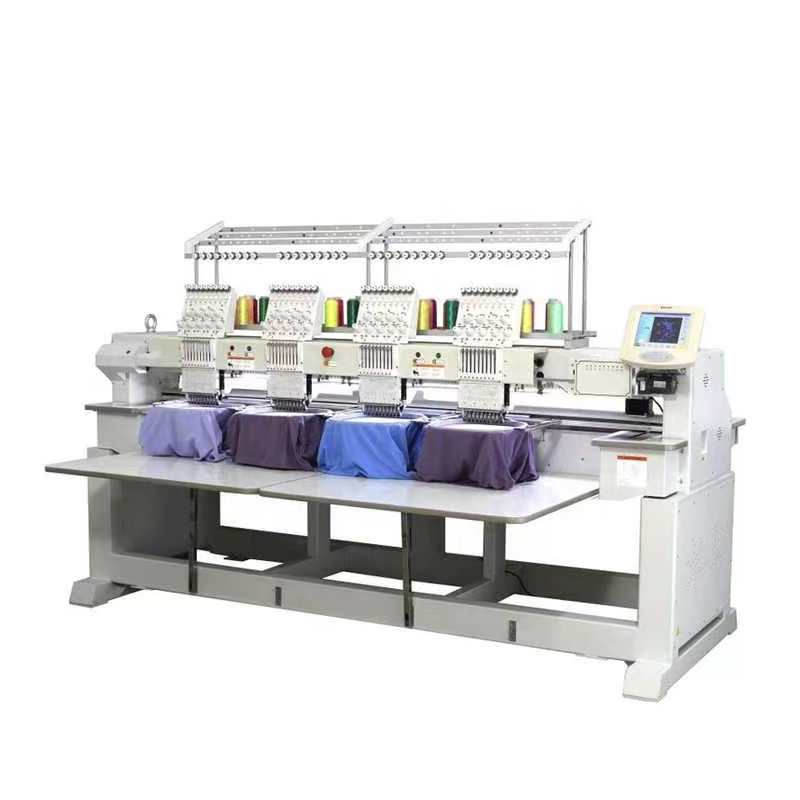
Beyond these core applications, professional embroidery machine technology also finds its niche in specialized sectors. For instance, in the automotive industry, precise embroidery is used for car seat logos and interior trim accents, where durability and aesthetic appeal are paramount. Similarly, in the medical field, machines can be adapted for precise stitching on specialized textiles for protective gear or medical devices, requiring sterile and robust finishes. The technical advantages in these contexts include unparalleled stitch precision, crucial for intricate details and complex logos, and high durability, ensuring the embroidery withstands rigorous use and washing cycles. Furthermore, the automation capabilities of these machines significantly reduce labor costs and human error, leading to higher throughput and consistent quality across all production runs. For small to medium enterprises, the versatility to switch between different types of hooping systems—flat, cap, and cylindrical—expands their service offerings, allowing them to cater to a broader client base and capitalize on diverse market opportunities, optimizing resource utilization and increasing profitability through diversified revenue streams.
Strategic Investment: Manufacturer Comparison and Customized Solutions
Choosing the right professional embroidery machine is a strategic investment that requires careful consideration of various manufacturers and their specific offerings. While many brands exist, leading manufacturers distinguish themselves through superior build quality, advanced technological features, and comprehensive after-sales support. Key factors to compare include the machine’s maximum stitch speed, the variety and size of hoops supported, the intuitiveness of the control panel, and the robustness of its software integration capabilities. Energy efficiency and noise levels are also increasingly important considerations for modern production environments. For businesses focused on apparel customization, comparing t shirt embroidery machine capabilities, such as specialized hooping systems for garments and fabric handling, is crucial. Moreover, the reputation for durability and longevity, often reflected in the manufacturer's warranty and typical operational lifespan, provides a strong indicator of long-term value. Companies like those offering the Embroidery Machines Computerized 4 head 12 needle New Second Hand Embroidery Machine often provide models that balance performance with cost-effectiveness, appealing to both startups and established businesses looking to expand their capabilities.
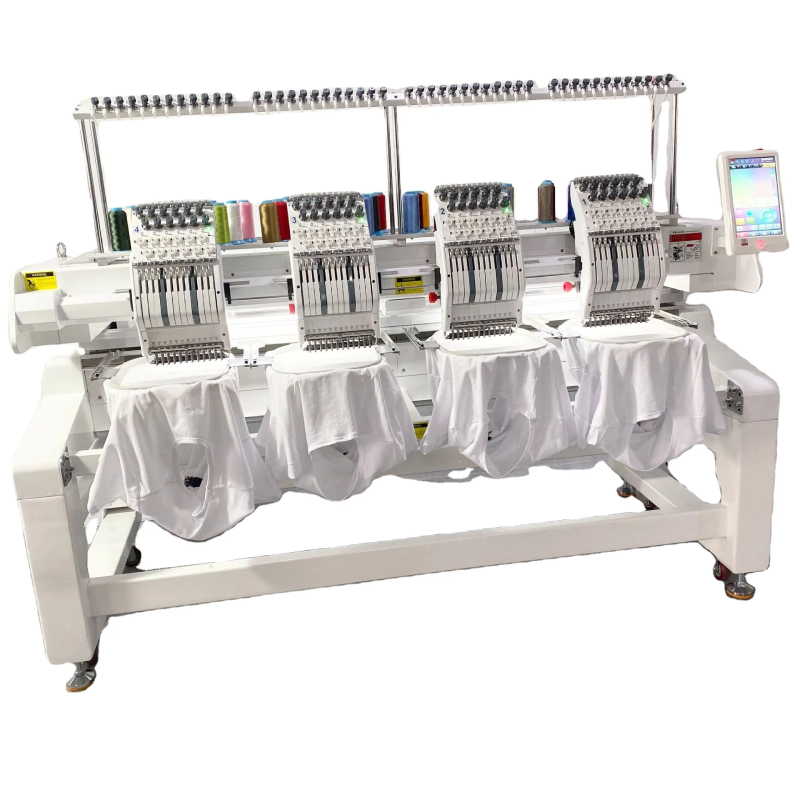
Beyond standard models, many reputable manufacturers offer customized solutions to meet specific client requirements. This could involve configuring multi-head machines with a precise number of heads and needles, integrating specialized hooping systems for unique product types (e.g., shoes, bags, or large format textiles), or developing bespoke software features for specific production workflows. Customization ensures that the machine is perfectly aligned with the client's operational scale, product range, and desired output quality, maximizing efficiency and minimizing waste. For instance, a business requiring high-volume customization of promotional wear might opt for a multi-head system with enhanced cap embroidery capabilities, while a fashion brand might prioritize machines with finer stitch control for delicate fabrics. Engaging with manufacturers that offer robust technical support, training programs, and readily available spare parts is critical for minimizing downtime and ensuring continuous operation. This collaborative approach between client and manufacturer is fundamental to leveraging the full potential of a professional embroidery machine, transforming it from a mere purchase into a strategic partnership that drives sustained business growth and innovation.
Ensuring Trust: Quality Assurance, Support, and Warranty Commitments
For B2B buyers investing in a professional embroidery machine, trustworthiness is paramount, built upon clear commitments to quality assurance, robust customer support, and comprehensive warranty programs. Reputable manufacturers adhere to international quality standards, such as ISO 9001, ensuring that every stage of production, from material sourcing to final assembly and testing, meets stringent benchmarks. Certifications like CE and FCC further validate compliance with European and North American safety and electromagnetic compatibility regulations, respectively. A transparent delivery cycle, typically ranging from 15 to 45 business days depending on customization and shipping destination, provides predictability for business planning. This involves detailed communication regarding order processing, manufacturing lead times, quality checks, and logistics, ensuring clients are informed at every step. Furthermore, the provision of detailed user manuals, technical specifications, and online resources empowers operators to maximize machine performance and troubleshoot minor issues independently, reducing reliance on immediate support.
Frequently Asked Questions (FAQ)
Q1: What is the typical lifespan of a professional embroidery machine?
A1: With proper maintenance and regular servicing, a high-quality professional embroidery machine can have an operational lifespan of 10 to 15 years, or even longer, consistently delivering high performance and precise embroidery.
Q2: How does a multi-head machine benefit businesses, especially for t shirt embroidery machine applications?
A2: Multi-head machines drastically increase productivity by allowing simultaneous embroidery on multiple items. This is particularly beneficial for high-volume orders of t-shirts, caps, and other apparel, significantly reducing production time and increasing throughput compared to single-head units.
Q3: What kind of after-sales support can I expect?
A3: Reputable manufacturers offer comprehensive after-sales support including remote technical assistance, online troubleshooting guides, video tutorials, and readily available spare parts. Many also provide on-site service or network with local technicians for more complex issues, ensuring minimal downtime.
A strong warranty commitment further solidifies trust. Typically, a professional embroidery machine comes with a standard warranty covering major components for 1 to 3 years, with options for extended coverage. This warranty signifies the manufacturer's confidence in their product's reliability and provides peace of mind for the buyer. Comprehensive customer support is critical for long-term operational success. This includes readily accessible technical support hotlines, online diagnostic tools, and a global network of service partners for on-site assistance. Training programs for operators and maintenance staff are also frequently offered, ensuring that businesses can maximize the efficiency and longevity of their investment. By providing these assurances, manufacturers demonstrate their dedication to product quality and client success, fostering long-term relationships and establishing their authority in the competitive embroidery machine market. The availability of genuine spare parts and consumables is also a key factor in ensuring continuous, reliable operation, highlighting a manufacturer’s commitment to sustained product performance.
Conclusion: Driving Innovation and Efficiency in Textile Embellishment
The continuous evolution of the professional embroidery machine underscores its pivotal role in modern textile embellishment and custom apparel production. From advanced multi-head systems and precise computer numerical control to sophisticated software integration and robust material engineering, these machines embody a synergy of mechanical precision and digital intelligence. The ability to produce high-quality, intricate designs rapidly and consistently positions them as indispensable assets for businesses across fashion, promotional goods, and specialized industrial applications. As demand for personalized and branded items continues to surge, the efficiency, versatility, and reliability offered by a state-of-the-art t shirt embroidery machine system become increasingly critical for maintaining a competitive edge. Strategic investment in these technologies, supported by comprehensive manufacturer commitments to quality, service, and ongoing innovation, is key to unlocking new levels of productivity and creative possibility. Businesses that leverage these advanced capabilities are well-positioned to meet the dynamic demands of the global market, delivering superior products with optimized operational workflows, thereby securing their future success in an ever-evolving industry.
References
- Smith, J. (2022). "Advances in Computerized Embroidery Technology: A Review." Journal of Textile Engineering and Technology.
- Chen, L. (2021). "The Impact of Automation on Apparel Manufacturing Productivity." International Journal of Fashion Studies.
- Wang, P. (2023). "Material Science Innovations in Precision Machinery Manufacturing." Materials Science and Engineering Reports.
- Global Market Insights. (2023). "Embroidery Machine Market Size, Share & Trends Analysis Report."
- ISO. (2023). "ISO 9001:2015 Quality Management Systems – Requirements."
-
Professional Embroidery Machine: High-Quality T-Shirt Production
NewsAug.16,2025
-
Affordable Computer Embroidery Machine Prices & Deals
NewsAug.15,2025
-
Affordable Automatic Embroidery Machines: Flat, Cap & Multi-Head
NewsAug.14,2025
-
Cheap Computer Embroidery Machine Price | Pro Cap Embroidery
NewsAug.13,2025
-
Best Industrial Embroidery Machines for Sale – Heavy Duty & Reliable
NewsAug.12,2025
-
Embroidery Machine Manufacturers: Best Buy & Industrial Models
NewsAug.11,2025

Copyright © 2025 Xingtai Pufa Trading Co., Ltd All Rights Reserved. Sitemap | Privacy Policy
